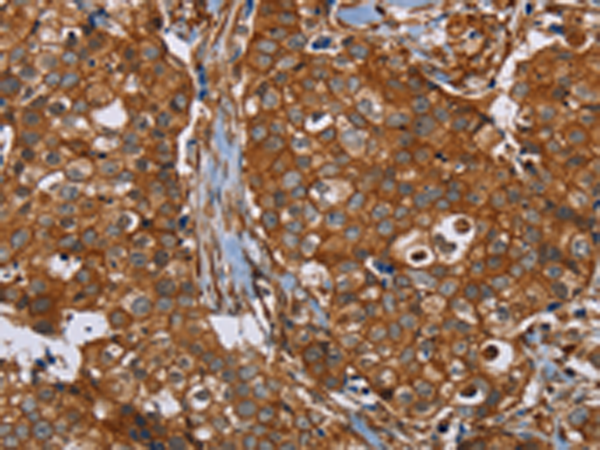
| WB | 咨询技术 | Human,Mouse,Rat |
| IF | 咨询技术 | Human,Mouse,Rat |
| IHC | 1/50-1/200 | Human,Mouse,Rat |
| ICC | 技术咨询 | Human,Mouse,Rat |
| FCM | 咨询技术 | Human,Mouse,Rat |
| Elisa | 1/2000-1/5000 | Human,Mouse,Rat |
| Aliases | HD1; PCN; EBS1; EBSO; PLTN; PLEC1; LGMD2Q; PLEC1b |
| Host/Isotype | Rabbit IgG |
| Antibody Type | Primary antibody |
| Storage | Store at 4°C short term. Aliquot and store at -20°C long term. Avoid freeze/thaw cycles. |
| Species Reactivity | Human, Mouse, Rat |
| Immunogen | Synthetic peptide of human PLEC |
| Formulation | Purified antibody in PBS with 0.05% sodium azide and 50% glycerol. |
+ +
以下是3篇关于PLEC抗体的代表性文献摘要:
1. **《Plectin as a target antigen in autoimmune bullous diseases》**
作者:Natsuga K, Nishie W, Shinkuma S, et al.
摘要:该研究证实PLEC(plectin)是大疱性表皮松解症患者血清中的自身抗原,发现抗PLEC抗体的存在与皮肤基底膜区IgG沉积相关,提示其在疾病病理中的潜在作用。
2. **《Autoantibodies against plectin in paraneoplastic pemphigus》**
作者:Probst C, Schlumberger W, Stöcker W, et al.
摘要:研究发现副肿瘤性天疱疮患者体内存在抗PLEC抗体,表明PLEC可能是此类疾病的新型靶抗原,可能与肿瘤相关的免疫交叉反应有关。
3. **《Plectin deficiency leads to both muscular dystrophy and pemphigus-like disease in mice》**
作者:Andrä K, Nikolic B, Stöcher M, et al.
摘要:通过小鼠模型证明PLEC基因缺陷会导致皮肤脆性和自身免疫反应,揭示了PLEC在维持细胞-基质连接中的关键作用及抗体产生的机制基础。
注:以上文献为领域内代表性研究方向,具体引用时建议通过PubMed或学术数据库核对最新版本及细节。
**Background of PLEC Antibodies**
Plectin (PLEC), a high-molecular-weight cytoskeletal protein, plays a critical role in maintaining cellular integrity by linking intermediate filaments, microtubules, and actin microfilaments. It also stabilizes cell-matrix adhesions and regulates signaling pathways. Autoantibodies targeting plectin, termed PLEC antibodies, are primarily associated with autoimmune blistering diseases, particularly **mucous membrane pemphigoid (MMP)** and **paraneoplastic pemphigus (PNP)**.
PLEC antibodies were first identified in patients with PNP, a rare, severe autoimmune disorder often linked to underlying malignancies. These autoantibodies disrupt plectin-mediated cytoskeletal organization, leading to epithelial detachment and blister formation. Detection methods include indirect immunofluorescence (IIF) on epithelial substrates and immunoblotting using recombinant plectin proteins.
Clinically, PLEC antibodies serve as diagnostic markers for specific autoimmune subtypes. Their presence may correlate with disease severity and poor prognosis, especially in PNP. However, PLEC autoimmunity remains less characterized compared to other target antigens (e.g., desmogleins). Research continues to explore their pathogenic mechanisms, epitope mapping, and potential therapeutic implications, such as targeting B-cell pathways. Despite progress, standardized assays and clinical validation are needed to optimize diagnostic and prognostic utility.
×